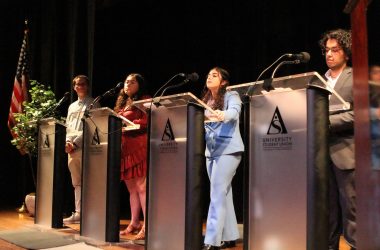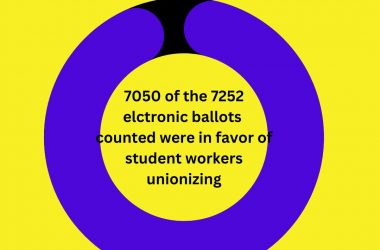California State University faculty would receive a 10.5 percent salary increase in the three-year tentative agreement between California Faculty Association labor leaders and CSU management, but whether the raise will really solve the faculty wage crisis, especially among non-tenure-track professors, remains uncertain.
CSU Chancellor Timothy White and CFA President Jennifer Eagan announced the terms of the agreement in a joint press conference in Sacramento Friday morning, averting the five-day strike that would have begun Wednesday.
“What the CSU faculty has done is historic,” Eagan said. “We avoided the largest strike in higher education history. The largest strike that actually didn’t happen.”
White said he was delighted that the CSU and CFA had reached a tentative agreement.
“The ratification process is next, and I know that I will be commending this agreement to the Board of Trustees, and I know that the CFA leadership will be doing the same to their members,” White said.
The CFA and CSU management announced a 48-hour blackout period on strike planning, communication efforts and news last Monday to allow negotiations. In that time, the chancellor stepped in to actively participate in the negotiation process for the first time.
President of the Cal State Long Beach CFA chapter Douglas Domingo-Forasté said the chancellor took a mostly hands-off approach to the bargaining process during the last 11 months, but that he called Eagan to restart negotiations as the result of the fact finder’s report, subsequent pressure from various other sources and the realization that faculty were serious about striking next week.
“He called Jennifer Eagan, who had tried to call him [and] get him involved many times before, she said,” Domingo-Forasté said. “So, that’s when things got done — when he decided to be personally involved.”
The terms of the agreement include a 5 percent general salary increase June 30, a 2 percent general salary increase one day later on July 1 and a 3.5 percent general salary increase on July 1, 2017.
The June and July increases will take place at the end of this fiscal year and the beginning of the next, respectively.
Cal State Long Beach Department of International Studies professor Kimberly Walters said Friday the faculty she’s spoken to so far are happy to receive the raise and see the union stand up to the chancellor in a way that led to progress.
But not all members of the CFA are celebrating a victory.
“The employment situation has deteriorated so much over the last few decades that there is still a great deal that needs to be done to make CSU administrators begin to think about faculty as something other than automatons on a factory floor, churning out students with degrees,” Walters said. “Ultimately, a real win would be a change of culture among CSU administrators — rejecting a corporate model for the university and reinstating a more humane model of what higher education can and should be.”
The raise is not retroactively effective. In order to provide faculty with that raise, Chancellor White said the CSU would use the funds originally allocated to provide faculty with a 2 percent raise this fiscal year — money the CSU has not yet spent while negotiations were in progress — combined with the salary increase the CSU budgeted for the next fiscal year and “a few other small adjustments.”
“It was the addition of time in the agreement that was the instrumental aspect of our discussion that created a new environment for us to find a solution together,” White said.
Growth in faculty in the CSU over the last decade is largely the result of an increase in the number of faculty hired for temporary and part-time appointments. Such positions have grown by 46 percent, according to a CFA report. The university system saves money since it need only pay temporary and part-time lecturers a fraction of the salary full-time professors receive.
With rising levels of these non-tenure-track professors, a 10.5 percent raise ends up costing a lot less. For example, 10.5 percent of $100,000 — what only 4.9 percent of CSU faculty make each year— is a significant pay raise, at $10,500 more.
But with more than half of CSU faculty taking home less than $38,000 in gross earnings per year, the same raise results in a new yearly gross income of $41,990.
Temporary faculty at Long Beach City College who have a bachelor’s degree start out making $52,330, according to the LBCC temporary faculty hourly pay schedule.
After Walters did some calculations, she said she realized that after all the promised salary raises, her total pay increase will be less than what her brother — a computer engineer with no college degree — makes in one week.
“So while it is nice to receive a pay bump, the overall fact remains: Those of us who work in higher education continue to be undervalued, despite our key role in the future of a country and a planet in crisis,” Walters said. “That should change.”
The consumer price index, which seeks to measure the cost of living, went up about 14 percent in the last 10 years, according to the Bureau of Labor Statistics.
In that same time period, CSU faculty have not received a significant raise, according to CFA data. Even if faculty received all of the 10.5 percent increase this year, it still would not place salary buying power at pre-recession levels.
Some of the other agreement measures include a 2.65 percent service salary increase for the 2017-18 fiscal year, a minimum salary increase from 7.5 percent to 9 percent for faculty who get promoted, a labor contract extension of one year up to June 30, 2018, and the creation of a working group to study the problem of pay increases for lecturers.
CSULB history and international studies professor Angela Hawk said that as a lecturer herself, she is attuned to the issues temporary faculty face and that she would like to see the CFA and CSU administration continue to prioritize the financial and job security of those lecturers.
“… While it’s encouraging to see the issue of Lecturer Range Elevations addressed in the Tentative Agreement, I might have liked to have seen more progress than forming a ‘working group to study the problem.’”
That working group is set to determine a solution by March 1, 2017.
Also, all faculty hired after July 1, 2017 must work for 10 years instead of five years to receive full health and dental benefits when they retire.
In an important CFA victory, the CSU has agreed to negotiate salary decisions with the CFA prior to the establishment of the CSU’s budget process and its request for funding from the legislature. Prior to this addition, the CFA had filed an unfair labor practice charge against the CSU for failing to bargain in good faith when the CSU Board of Trustees proposed a budget to Gov. Brown before any negotiations with the CFA.
The Higher Education Employer-Employee Relations Act requires the CSU management and CFA to reach an agreement on salary before the university sends a budget request to the legislature and governor. At the time, Kevin Wehr, chair of the CFA Bargaining Team and a professor at Sacramento State University, said the chancellor had “put the cart before the horse.”
“The fact finder’s report really made our case for us,” Domingo-Forasté said. “The only thing it didn’t say was that the collective CSU’s pants were on fire.”
The chancellor largely blamed the faculty wage disparity on the State of California for underfunding the public university system and vowed to work alongside the CFA in the future to lobby in Sacramento for an increase in funding.
White also said the tentative agreement that comes with averting the strike was good news for the 470,000 students in the CSU system, since not only will they continue to attend class without interruption, but students will also benefit from the CSU’s investment in faculty.
“ … By investing in faculty, it allows us at the academic department level to hire, recruit and retain the best faculty members,” White said.
CSULB junior Japanese major Marvin Hidalgo said Thursday he was pleased that the CFA and CSU were going to announce the agreement.
“I am glad that the chancellor along with the administrators and the faculty came to an agreement, but honestly it still does not put them equal when it comes to wages,” Hidalgo said.
Mario Amaro, a sociology and communications major, said that though students would have missed class, the professors need to strike was more of a priority.
“There is other issues going on here on campus, like violence, and I think it is kind of sad that the strike is not going to take place this semester,” Amaro said.
If the tentative agreement isn’t ratified by the CFA membership and the Board of Trustees, the CFA will plan to strike again, although such a strike wouldn’t take place this semester.
“It’s a good settlement, not perfect, but good,” Domingo-Forasté said. “We’ll slowly start to climb ourselves back into a reasonable salary situation.”
The CFA board of directors approved the agreement Thursday night, and CFA members will vote to ratify the tentative agreement by the end of April. The CSU will vote for ratification at the Board of Trustees meeting May 24-25.
Faculty would see a raise reflected in their paychecks between July and August.
Yasmin Cortez and Erik Ohrstrom also contributed to this story.
This story has been updated April 10, 9:33 p.m.




This is what happens when people stand together. As this article points out, more needs to be done in the future. This is definitely a step in the right direction.
Congratulations to the staff and students!